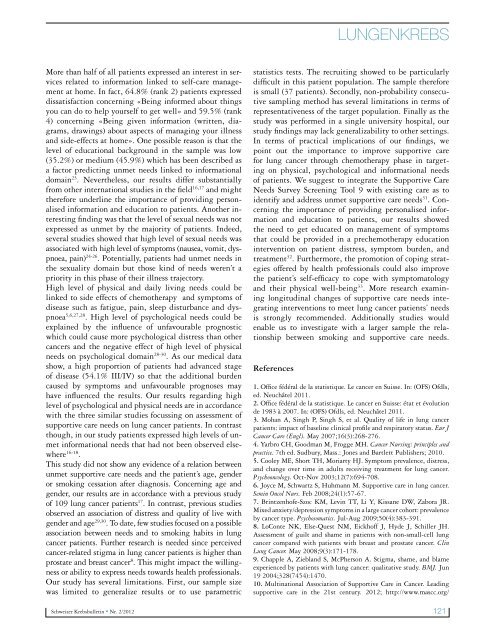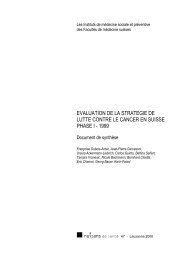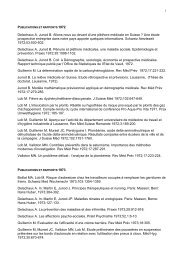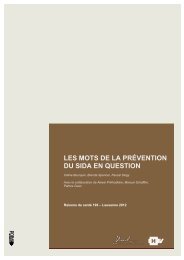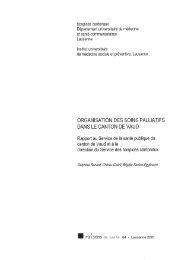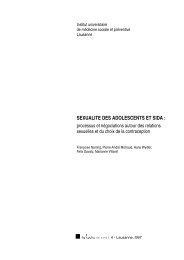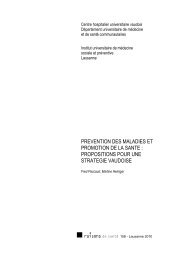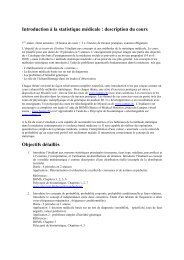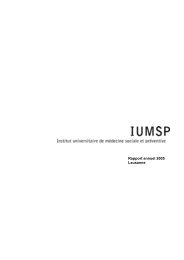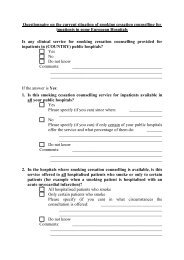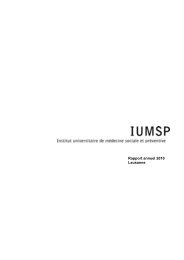Fortbildungen / Formations continues 2012 - IUMSP
Fortbildungen / Formations continues 2012 - IUMSP
Fortbildungen / Formations continues 2012 - IUMSP
Sie wollen auch ein ePaper? Erhöhen Sie die Reichweite Ihrer Titel.
YUMPU macht aus Druck-PDFs automatisch weboptimierte ePaper, die Google liebt.
More than half of all patients expressed an interest in services<br />
related to information linked to self-care management<br />
at home. In fact, 64.8% (rank 2) patients expressed<br />
dissatisfaction concerning «Being informed about things<br />
you can do to help yourself to get well» and 59.5% (rank<br />
4) concerning «Being given information (written, diagrams,<br />
drawings) about aspects of managing your illness<br />
and side-effects at home». One possible reason is that the<br />
level of educational background in the sample was low<br />
(35.2%) or medium (45.9%) which has been described as<br />
a factor predicting unmet needs linked to informational<br />
domain 23 . Nevertheless, our results differ substantially<br />
from other international studies in the �eld 16,17 and might<br />
therefore underline the importance of providing personalised<br />
information and education to patients. Another interesting<br />
�nding was that the level of sexual needs was not<br />
expressed as unmet by the majority of patients. Indeed,<br />
several studies showed that high level of sexual needs was<br />
associated with high level of symptoms (nausea, vomit, dyspnoea,<br />
pain) 24-26 . Potentially, patients had unmet needs in<br />
the sexuality domain but those kind of needs weren’t a<br />
priority in this phase of their illness trajectory.<br />
High level of physical and daily living needs could be<br />
linked to side effects of chemotherapy and symptoms of<br />
disease such as fatigue, pain, sleep disturbance and dyspnoea<br />
5,6,27,28 . High level of psychological needs could be<br />
explained by the in�uence of unfavourable prognostic<br />
which could cause more psychological distress than other<br />
cancers and the negative effect of high level of physical<br />
needs on psychological domain 28-30 . As our medical data<br />
show, a high proportion of patients had advanced stage<br />
of disease (54.1% III/IV) so that the additional burden<br />
caused by symptoms and unfavourable prognoses may<br />
have in�uenced the results. Our results regarding high<br />
level of psychological and physical needs are in accordance<br />
with the three similar studies focussing on assessment of<br />
supportive care needs on lung cancer patients. In contrast<br />
though, in our study patients expressed high levels of unmet<br />
informational needs that had not been observed elsewhere<br />
16-18 .<br />
This study did not show any evidence of a relation between<br />
unmet supportive care needs and the patient’s age, gender<br />
or smoking cessation after diagnosis. Concerning age and<br />
gender, our results are in accordance with a previous study<br />
of 109 lung cancer patients 17 . In contrast, previous studies<br />
observed an association of distress and quality of live with<br />
gender and age 29,30 . To date, few studies focused on a possible<br />
association between needs and to smoking habits in lung<br />
cancer patients. Further research is needed since perceived<br />
cancer-related stigma in lung cancer patients is higher than<br />
prostate and breast cancer 8 . This might impact the willingness<br />
or ability to express needs towards health professionals.<br />
Our study has several limitations. First, our sample size<br />
was limited to generalize results or to use parametric<br />
statistics tests. The recruiting showed to be particularly<br />
dif�cult in this patient population. The sample therefore<br />
is small (37 patients). Secondly, non-probability consecutive<br />
sampling method has several limitations in terms of<br />
representativeness of the target population. Finally as the<br />
study was performed in a single university hospital, our<br />
study �ndings may lack generalizability to other settings.<br />
In terms of practical implications of our �ndings, we<br />
point out the importance to improve supportive care<br />
for lung cancer through chemotherapy phase in targeting<br />
on physical, psychological and informational needs<br />
of patients. We suggest to integrate the Supportive Care<br />
Needs Survey Screening Tool 9 with existing care as to<br />
identify and address unmet supportive care needs 31 . Concerning<br />
the importance of providing personalised information<br />
and education to patients, our results showed<br />
the need to get educated on management of symptoms<br />
that could be provided in a prechemotherapy education<br />
intervention on patient distress, symptom burden, and<br />
treatment 32 . Furthermore, the promotion of coping strategies<br />
offered by health professionals could also improve<br />
the patient’s self-ef�cacy to cope with symptomatology<br />
and their physical well-being 33 . More research examining<br />
longitudinal changes of supportive care needs integrating<br />
interventions to meet lung cancer patients’ needs<br />
is strongly recommended. Additionally studies would<br />
enable us to investigate with a larger sample the relationship<br />
between smoking and supportive care needs.<br />
References<br />
LUNGENKREBS<br />
1. Of�ce fédéral de la statistique. Le cancer en Suisse. In: (OFS) Ofdls,<br />
ed. Neuchâtel 2011.<br />
2. Of�ce fédéral de la statistique. Le cancer en Suisse: état et évolution<br />
de 1983 à 2007. In: (OFS) Ofdls, ed. Neuchâtel 2011.<br />
3. Mohan A, Singh P, Singh S, et al. Quality of life in lung cancer<br />
patients: impact of baseline clinical pro�le and respiratory status. Eur J<br />
Cancer Care (Engl). May 2007;16(3):268-276.<br />
4. Yarbro CH, Goodman M, Frogge MH. Cancer Nursing: principles and<br />
practice. 7th ed. Sudbury, Mass.: Jones and Bartlett Publishers; 2010.<br />
5. Cooley ME, Short TH, Moriarty HJ. Symptom prevalence, distress,<br />
and change over time in adults receiving treatment for lung cancer.<br />
Psychooncology. Oct-Nov 2003;12(7):694-708.<br />
6. Joyce M, Schwartz S, Huhmann M. Supportive care in lung cancer.<br />
Semin Oncol Nurs. Feb 2008;24(1):57-67.<br />
7. Brintzenhofe-Szoc KM, Levin TT, Li Y, Kissane DW, Zabora JR.<br />
Mixed anxiety/depression symptoms in a large cancer cohort: prevalence<br />
by cancer type. Psychosomatics. Jul-Aug 2009;50(4):383-391.<br />
8. LoConte NK, Else-Quest NM, Eickhoff J, Hyde J, Schiller JH.<br />
Assessment of guilt and shame in patients with non-small-cell lung<br />
cancer compared with patients with breast and prostate cancer. Clin<br />
Lung Cancer. May 2008;9(3):171-178.<br />
9. Chapple A, Ziebland S, McPherson A. Stigma, shame, and blame<br />
experienced by patients with lung cancer: qualitative study. BMJ. Jun<br />
19 2004;328(7454):1470.<br />
10. Multinational Association of Supportive Care in Cancer. Leading<br />
supportive care in the 21st century. <strong>2012</strong>; http://www.mascc.org/<br />
Schweizer Krebsbulletin � Nr. 2/<strong>2012</strong> 121


